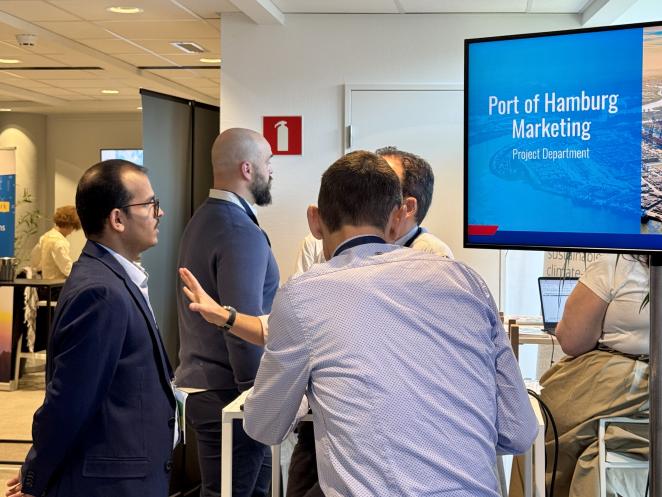From researchers and start-ups to associations, energy communities and consumer groups, the European Sustainable Energy Week (EUSEW) brought them all together. EUSEW offered a unique opportunity to connect with a diverse community of energy experts driving the sustainable transition!
In talks with participants.
The Green Supply Chains project teamed up with a couple of Interreg and Horizon projects to jointly exhibit and engage with stakeholders.
The European Sustainable Energy Week (EUSEW) has become a cornerstone of Europe’s clean energy movement. In its 19th edition, this flagship event brought together a passionate community committed to building a secure and sustainable energy future for the generations to come. Over 450 leaders from the energy transition joined as speakers and provided profound background information, fruitful discussions and engaging contributions.
The Blue Supply Chains project teamed up with a couple of Interreg and Horizon projects to jointly exhibit and engage with stakeholders. Altogether the represented partners showcased how European co-financed project are supporting decarbonisation in maritime logistics.
The interest from participants has been remarkable! We’ve had promising conversations, formed new connections, and engaged in insightful discussions about the energy transition and the vital role ports can play in achieving climate neutrality. It was a privilege to be part of this inspiring conference and fair.

In talks with participants.
EU Sustainable Energy Week in Brief.
Sessions during the EUSEW highlighted the transition from strategy to implementation, the programme featured practical solutions to decarbonise buildings and industry, scale clean tech, and modernise Europe’s energy infrastructure. At the opening session – attended by high-level representatives from EU institutions, Member States, and industry – the agenda for this year’s conference was set under the theme “Powering a fair and competitive green transition.”
One quote in particular stood out from Krzysztof Bolesta, Secretary of State at the Polish Ministry of Climate and Environment:
“For the energy transition to be effective, we need three elements:
- Cheaper and affordable energy for people and businesses.
- Technological neutrality – all low- and zero-carbon technologies matter.
- And sustainable energy independence – we must bring as much of the energy value chain as possible back to Europe.”
Second day’s sessions explored the growing importance of energy communities, the electrification of heat and industry, and the transformative potential of AI, digital tools, and fusion energy.
On the third day sessions went deeper into the integration of hydrogen, biomethane and AI, alongside industrial renovation and energy efficiency in the built environment.
Feel you missed something?
All sessions are available for replay on the official EUSEW platform: https://interactive.eusew.eu
In talks with participants.
Following projects have been involved:
InterSTORE (Horizon Europe Programme): an EU-funded project that aims to deploy and demonstrate a set of interoperable Open-Source tools to integrate Distributed Energy Storage (DES) and Distributed Energy Resources (DER), to enable the hybridisation, utilisation and monetisation of storage flexibility, within a real-life environment. https://interstore-project.eu
MAGPIE (Horizon 2020 Programme) aims at accelerating the transition to sustainable, zero-emission ports. It brings together ports, industry partners, and research institutions to develop technologies for clean energy, smart logistics, and multimodal transport. Focused on Rotterdam and other key European ports, MAGPIE serves as a blueprint for the green ports of the future. https://www.magpie-ports.eu
PIONEERS (Horizon 2020 Programme) addresses the challenges faced by European ports to reduce their environmental impact while remaining competitive and offering added value in a sustainable global trade ecosystem. https://pioneers-ports.eu
H2Derivatives@BalticSeaPorts (Interreg Baltic Sea Region Programme) helps port authorities, terminal operators and energy providers integrate green hydrogen derivatives fuels, such as methanol and ammonia, into port operations to reduce CO2 emissions and turn seaports into green energy hubs. https://interreg-baltic.eu/project/h2deribsp
Blue Supply Chains (Interreg Baltic Sea Region Programme) supports port authorities and port operators to decarbonise port operations by advancing electrification, providing alternative fuels strategies and setting up green transport chains. https://interreg-baltic.eu/project/bluesupplychains
Green Supply Chains (Interreg North Sea Region Programme) aims at providing synergies on green fuel- & electrification strategies from (inland) ports and greening strategies from regions affected by ports’ hinterland freight transport. To ensure market acceptance and openness for a wider port community (including smaller rural ports), GSC develops and tests best-practices, like OPS solutions for small ports(Skagen) or an innovative e-power supply solution (Brest). The pilots serve as blueprints for further roll-out in the NSR. https://www.interregnorthsea.eu/green-supply-chains
Renewable Energy Development and Intelligent Implementation in Ports – REDII Ports (Interreg North Sea Region Programme) aims to exploit resources for a technically feasible and economically affordable generation, storage and consumption of cleaner energy and fuels. The project aims to exploit resources for a technically feasible and economically affordable generation, storage and consumption of cleaner energy and fuels with specific reference to the REDII 2018/200+AFID 2014/94 Directives. https://www.interregnorthsea.eu/redii-ports
H2Ignite’s (Interreg North Sea Region Programme) mission Is to accelerate emerging hydrogen initiatives in regional ecosystems, connecting industry, policy, and research to fast-track sustainable transport solutions. Over the next three years (September 2024 – August 2027), we’ll be driving innovation on the ground through pilot projects, testing new business models, and unlocking the policy frameworks needed to scale hydrogen solutions. https://www.interregnorthsea.eu/h2ignite
GRIT (Interreg North Sea Region Programme) aims to support access to skilled technicians for the green industrial transition involving hydrogen and related techniques. Transnational cooperation strengthens the joint development of strategies and implementation of pilots to attract and (up-/re-) skill (future) technicians. https://www.interregnorthsea.eu/grit